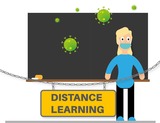
In this article we describe and highlight the main problems and Suggestion regarding the education system due to Covid-19.
- Subject:
- Information Science
- Material Type:
- Case Study
- Author:
- Arslan Ahmad
- Date Added:
- 08/22/2021


In this article we describe and highlight the main problems and Suggestion regarding the education system due to Covid-19.
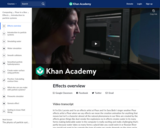
Overview of this lesson.
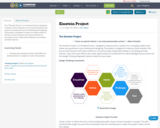
The “Einstein Project” is a framework that is designed to help you find a solution to an everyday problem that makes you passionate in your thinking and designing. This project is designed to make you think outside of the box as active learners and create solutions in uncommon ways, forget about failing or succeeding and take chances.
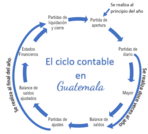
El ciclo contable en Guatemala.
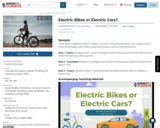
SYNOPSIS: In this lesson, students conduct research on electric bicycles and electric cars, choose one of these technologies, and create a video promoting its use as a climate solution.
SCIENTIST NOTES: Over the course of their use, electric cars are far more environmentally friendly than conventional automobiles. This lesson examines those benefits as well as how to make cities friendlier to bikes and other commuting options. The external resources in this lesson have passed our scientific review process.
POSITIVES:
-Students must use hard data to promote either electric bicycles or electric cars.
-Students record quick, informative videos as their assessment in this lesson plan.
ADDITIONAL PREREQUISITES:
-Students should have a basic understanding of climate change. They should know that burning fossil fuels creates greenhouse gases and that greenhouse gases are heating up the planet.
-There are fourteen total images in the Inquire section. Feel free to disregard some of them based on your needs.
-Many students assume that electric cars do not create emissions at all. Students will learn:
-There are embedded emissions from the manufacturing of electric cars.
-Electric cars that use electricity generated by fossil fuels (coal, oil, and gas) are still creating emissions.
-Your students will need access to devices to record their advertisements. Students can record themselves on iPods, iPads, laptops, or other school devices. Depending on your school's phone policy, you can have your students use their own devices.
DIFFERENTIATION:
-Be sensitive to the socioeconomic situation of your students. Some students' families may not own bicycles or cars or be able to afford electric bicycles or electric cars.
-Creating the advertisement can be done as a homework assignment.
-Students may want to include drawings, puppets, props, or other creative items in their advertisements. Encourage their creative expression!
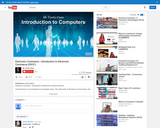
The last lesson in our Introduction to Computer series. This video looks at the basics of eCommerce. We define some basic terms and give examples.
Links from Video:
•Uncommon Adornments http://www.uncommonadornments.com/
•http://www.teacherspayteachers.com/Store/Mrfordsclass
•http://www.cafepress.com/
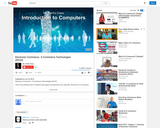
This is the software and IT systems that support transactions over networks. We look at: E-Commerce Hosts, Digital Money and Online Advertising.
This is out last video in the Introduction to Computers, BCIS, BIM series. We thank you for watching and look forward to seeing you in our next course.
Links from Video:
•What is Bitcoin? http://youtu.be/Gc2en3nHxA4
•Please Subscribe http://www.pleasesubscribefilm.com/
•http://www.storenvy.com/
•http://www.cafepress.com/
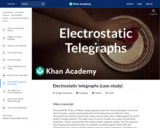
Long before the internet people thought about sending information along wires using static electricity. Created by Brit Cruise.
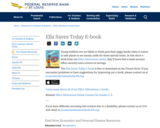
Young children are not likely to think past their piggy banks when it comes to safe places to set money aside for those special items. In this short e-book from our Ella's Adventures series, they'll learn that a bank account offers security and a return on savings.
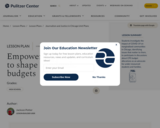
The Chicago Public Schools typically operate with a $7.7 billion annual budget that now has over $2.3 billion in federal stimulus funding to address inequities, COVID-related impacts and gaping needs. That is a 30% increase beyond a typical CPS budget that normally has very little room to address historic inequities. However, there is no participatory budget process in place to allow students or CPS families to have their voices heard in the process. This unit plan is designed to change that and provide opportunities for students to directly influence the budget process at this critical moment when historic inequities have widened.
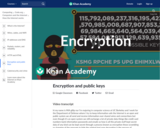
Mia Epner, who works on security for a US national intelligence agency, explains how cryptography allows for the secure transfer of data online. This video explains 256-bit encryption, public and private keys, SSL & TLS and HTTPS.
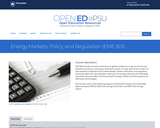
EME 801 provides a broad introduction to global markets for crude oil and refined petroleum products, natural gas, and electric power. A major goal of the course is to help students understand how market design, market institutions, and regulatory structures affect firm-level decision-making in the energy industries and ultimately, how these decisions affect the functioning of energy markets and the prospects for alternative technologies.
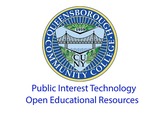
Engineering and Technology for the Better Good of Society PIT-OER is intended to train engineering technology students to leverage the power of select technologies aligned to the public interest applications and targeted public works institutions.This PIT-OER consists of four modules:Module 1: Project Management Methods with Applications to Public Works.Module 2: Technology and Ethics: “Are You Conflicted?”. Module 3: 3D Printing Applied to Everyday Public Interest and to Public Work Institutions.Module 4: How “Open” is Open Source Content: The Do’s and Don’t of Using Open Source Software, OSS. Each module is organized with lecture, assessment, and laboratory experiments. The modules are course materials for TECH-100, Introduction to Engineering and Technology, of Queensborough Community College.
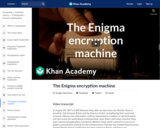
WW2 Encryption is explored with a focus on the Enigma. Read more here. Created by Brit Cruise.

Are you ready to BUILD? Get ready to launch an engaging community-building Challenge."More than 90% of the students and teachers who have completed our challenge said they would recommend it to others."Watch your students embrace entrepreneurial thinking as they create real-world solutions to today’s challenges. BUILD's Thriving Communities Design Challenge invites youth to use Design Thinking to answer: How might we build powerful, thriving communities where everyone enjoys safety, wellness, and economic freedom.
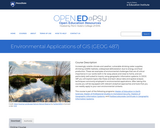
Increasingly volatile climate and weather; vulnerable drinking water supplies; shrinking wildlife habitats; widespread deforestation due to energy and food production. These are examples of environmental challenges that are of critical importance in our world, both in far away places and close to home, and are particularly well suited to inquiry using geographic information systems. In GEOG 487 you will explore topics like these and learn about data and spatial analysis techniques commonly employed in environmental applications. After taking this course you will be equipped with relevant analytical approaches and tools that you can readily apply to your own environmental contexts.

This video offers insight into the activities during the implementation of the Erasmus+ KA202 project "Future Trends in Clothing: Trendy, Smart and Healthy" (2018-2020).In this project three vocational schools from Austria, Spain, Germany cooperated with a general high school from Greece. The video is a documentation of the project's reached milestones, the great personal and work experiences we all gained during our international cooperation.It also shows how the work of everyone involved was still successfully concluded under the conditions of the Corona virus pandemic. Even if we where not able to manufacture & market our finalized product idea as planned, the skills we developed, shared and improved along the way are not less valuable.Now, enjoy the video and of course bear in mind ...“The European Commission support for the production of this publication does not constitute an endorsement of the contents which reflects the views only of the authors, and the Commission cannot be held responsible for any use which may be made of the information contained therein.”
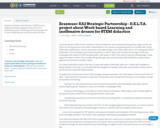
Intellectual Outputs from Erasmus+ DELTA project, offering teaching programmes about the use of inoffensive drones and Wrok based learning approach to boost STEM didactics in VET secodary education
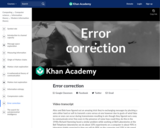
How can we communicate in the presence of noise? Created by Brit Cruise.

What are the ethical considerations for researchers who use data? This data primer describes standards for gathering, analyzing, storing, and distributing data for new data users and serves as a reference for advanced data users.